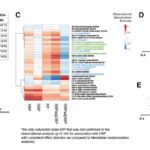2023-07-12 カリフォルニア大学サンディエゴ校(UCSD)
◆炎症とミトコンドリア機能障害の役割を比較した研究によると、GWIの症状の重症度はミトコンドリアの機能障害によって予測される一方、炎症とは関連がなかった。これにより、将来の臨床的介入ではミトコンドリアの機能障害に焦点を当てるべきであるとされました。また、ミトコンドリアの機能障害は、炎症の原因となることから、他の健康状態にも関連しており、新たな治療戦略の可能性を提供するとされています。
<関連情報>
- https://today.ucsd.edu/story/gulf-war-illness-caused-by-mitochondrial-dysfunction-not-inflammation
- https://www.nature.com/articles/s41598-023-35896-w
ミトコンドリア機能障害は湾岸戦争病の重症度を予測するが、末梢の炎症は予測しない Mitochondrial impairment but not peripheral inflammation predicts greater Gulf War illness severity
Beatrice A. Golomb,Roel Sanchez Baez,Jan M. Schilling,Mehul Dhanani,McKenzie J. Fannon,Brinton K. Berg,Bruce J. Miller,Pam R. Taub & Hemal H. Patel
Scientific Reports Published:12 July 2023
DOI:https://doi.org/10.1038/s41598-023-35896-w

Abstract
Gulf War illness (GWI) is an important exemplar of environmentally-triggered chronic multisymptom illness, and a potential model for accelerated aging. Inflammation is the main hypothesized mechanism for GWI, with mitochondrial impairment also proposed. No study has directly assessed mitochondrial respiratory chain function (MRCF) on muscle biopsy in veterans with GWI (VGWI). We recruited 42 participants, half VGWI, with biopsy material successfully secured in 36. Impaired MRCF indexed by complex I and II oxidative phosphorylation with glucose as a fuel source (CI&CIIOXPHOS) related significantly or borderline significantly in the predicted direction to 17 of 20 symptoms in the combined sample. Lower CI&CIIOXPHOS significantly predicted GWI severity in the combined sample and in VGWI separately, with or without adjustment for hsCRP. Higher-hsCRP (peripheral inflammation) related strongly to lower-MRCF (particularly fatty acid oxidation (FAO) indices) in VGWI, but not in controls. Despite this, whereas greater MRCF-impairment predicted greater GWI symptoms and severity, greater inflammation did not. Surprisingly, adjusted for MRCF, higher hsCRP significantly predicted lesser symptom severity in VGWI selectively. Findings comport with a hypothesis in which the increased inflammation observed in GWI is driven by FAO-defect-induced mitochondrial apoptosis. In conclusion, impaired mitochondrial function—but not peripheral inflammation—predicts greater GWI symptoms and severity.


